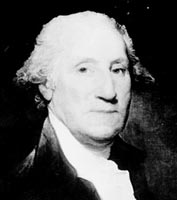|

|
George Washington on the Sedition Act
Guiding Question
- What arguments were offered in support of the Sedition Act?
Learning Objectives
After completing the lessons in this unit, students will be able to:
- Cite arguments Washington used in support of the Sedition Act.
Former President George Washington was an enormously well respected figure in 1798, widely regarded then and now as a reasonable man. He sympathized with the Federalist administration of his former vice president, John Adams. Washington's favorable attitude toward the Sedition Act illustrates that reasonable men in 1798 could support what most modern Americans would regard as an unjust law.
Students will now read Washington's own words to determine his position on the Sedition Act. Distribute one of the following Washington letters to each of five student groups. The full text of each letter is available on the EDSITEment-reviewed website American Memory by clicking on the links below. Or, you can use the excerpts provided on the handout "George Washington on the Sedition Act" on pages 13-14 of the PDF file (see Preparing to Teach This Curriculum Unit for download instructions). If desired, distribute the Written Document Analysis Worksheet from the EDSITEment resource Digital Classroom to aid students as they read the letters.
- George Washington to Alexander Spotswood, November 22, 1798
- George Washington to William V. Murray, December 26, 1798
- George Washington to John Marshall, December 30, 1798
- George Washington to Bushrod Washington, December 31, 1798
- George Washington to Patrick Henry, January 15, 1799
The following questions will help guide students' review of these documents:
- What arguments in favor of the Sedition Act does Washington cite?
- What principles does Washington cite in relation to the Sedition Act and the controversy that resulted?
- Which of Washington's remarks refer to partisan politics?
- What role, if any, does he indicate partisan politics played in either the creation of the Sedition Act or the controversy that followed?
If desired, as an extension of the lesson, students can read other material in favor of the Sedition Act, including:
In this charge to the grand juries in Pennsylvania's fifth district, Alexander Addison (1759-1807), president of Pennsylvania's county courts, defends the Sedition Act, arguing that it was necessary to restrain demagoguery.
What arguments are put forth? Keeping in mind that those in favor of the act considered the country in a virtual state of war with France, which points are particularly telling? What complaints against the Sedition Act are these arguments answering?
Assessment
Lead students in a discussion of what they learned through this lesson. They should be able to respond effectively to the following questions:
- What arguments were used in support of the Sedition Act?
- What specific complaints about the Sedition Act do those who support it cite? What counter-arguments do they use?
- What speech do students believe should be considered illegal?
- Do students believe laws about freedom of speech should be different for times of war and times of peace?
- In what ways did the Sedition Act protect security?
- In what ways did the Sedition Act abuse powers or take away fundamental rights granted in the Constitution and/or Bill of Rights?
- Did the Sedition Act tend, as written, to do more to protect security or to endanger freedom?
If desired, use the last bulleted question as the basis of a classroom debate.
Selected EDSITEment Websites
- American Memory [http://memory.loc.gov/]
- George
Washington to Alexander Spotswood, November 22, 1798
[http://memory.loc.gov/cgi-bin/query/r?ammem/mgw:@field
(DOCID+@lit(gw370024))]
- George
Washington to Bushrod Washington, December 31, 1798
[http://memory.loc.gov/cgi-bin/query/r?ammem/mgw:@field(DOCID+
@lit(gw370049))]
- George
Washington to John Marshall, December 30, 1798
[http://memory.loc.gov/cgi-bin/query/r?ammem/mgw:@field(DOCID+
@lit(gw370046))]
- George
Washington to Patrick Henry, January 15, 1799
[http://memory.loc.gov/cgi-bin/query/r?ammem/mgw:@field(DOCID+
@lit(gw370056))]
- George
Washington to William V. Murray, December 26, 1798
[http://memory.loc.gov/cgi-bin/query/r?ammem/mgw:@field(DOCID+
@lit(gw370041))]
- Papers of George
Washington
[http://memory.loc.gov/ammem/gwhtml/gwhome.html]
- Thomas Jefferson
Timeline
[http://memory.loc.gov/ammem/mtjhtml/mtjtime3b.html]
- The
Whigs hate and persecute the naturalized citizens
[http://memory.loc.gov/cgi-bin/query/r?ammem/rbpe:@field(DOCID+
@lit(rbpe19902900))]
- Argument Against Repeal of the Sedition Act
- Beginning
of Argument
[http://memory.loc.gov/cgi-bin/ampage?collId=llsp&fileName=037/
llsp037.db&recNum=189]
- Argument
Concluded
[http://memory.loc.gov/cgi-bin/ampage?collId=llsp&fileName=037
/llsp037.db&recNum=190]
Standards Alignment
View your state’s standards
|





